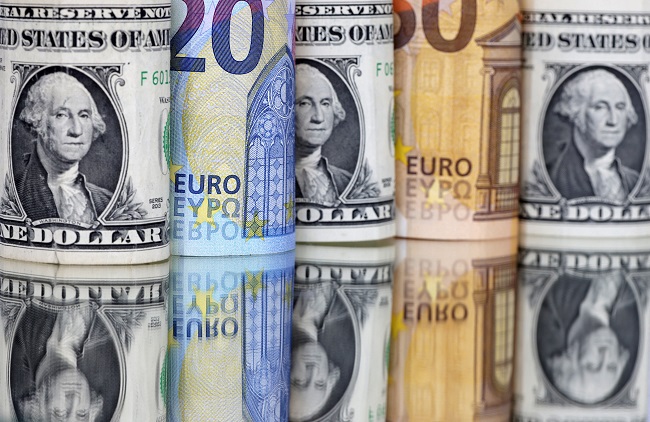Comparison of the Effects of a Strong and Weak Dollar on U.S. Businesses
Whether the economy is flourishing or contracting, financial professionals always talk about how strong the dollar is. When the value of the dollar drops, we have to pay more for the same imported good.
This is crucial for American companies who must pay for foreign-currency component purchases with Euros. Understanding the effects of a strong or weak dollar on U.S. firms can be tricky, so we’ll dive deeper into the matter here.

Causes of the Dollar’s Decline
If the value of the dollar drops in relation to those of other currencies, we say that the dollar is weak. If the dollar’s value decreased relative to the euro, for instance, and the exchange rate moved from $1 to €0.80 to $1 to €0.90, the dollar would be seen to have weakened. There could be several causes for this.
The first possible cause of a decline in the value of the dollar is monetary policy. Interest rate policy are implemented by the Federal Reserve (the Fed).
A weaker dollar may result from the Federal Reserve’s use of quantitative easing or a reduction in the interest rate to encourage consumer spending and economic growth.
Read Also:
- IPad Pro Case Compatible With Magic Keyboard
- Why Is Derek Chauvin Writing So Much
- Biden Healthcare Would Be An Insult To My Dead Son
Since 2008, both have been true: interest rates have been extremely low (at historic lows for the majority of the time), and the Federal Reserve has pumped trillions of dollars into the financial markets.
To counteract the effects of the pandemic on the U.S. economy, the FED increased its money printing to record levels.
Effects of the Dollar’s Decline on Businesses
There are positive and bad effects that might result from the dollar’s decreased purchasing power against foreign currencies, and these effects extend to both individuals and businesses.
Commercial exchanges: While a weak dollar makes imported goods more expensive, it makes American exports more competitive on the global market. Companies who need to import parts or finished goods from abroad will see price increases as a result. But if you export your products overseas, you can see a rise in demand.
Costs have gone up: If your company does not engage in international trade, you may nevertheless find that costs have grown. Some things, including gas, travel, and commodities, are more likely to increase in price in response to a weak currency. Thus, a weak dollar could reduce your profits if you need to buy plastics or fuel for your machines and automobiles.
Putting money into stocks: If a corporation is vulnerable to fluctuations in the value of the dollar, that can have an effect on the stock price.
Potential for more loans: A high dollar can be detrimental to the American economy. The effects are the same as those of a tighter monetary policy, such as an increase in interest rates. When the dollar declines in value, interest rates typically fall as a result. As a result, more people and companies will be able to qualify for loans.
loosening up of the credit restrictions: In continuation of the preceding argument, when the dollar is weak, creditors may provide more lenient credit terms to attract borrowers. Therefore, if you sign a new financial arrangement, you can not only be eligible for a more appealing rate, but also provide less limits and more advantageous terms.
Adjustments in consumer spending: Reduced expenditure is possible as a result of a weak dollar, which raises the price of imported items. When sales drop, stores may raise prices on other items to make up the difference and produce more income. Consumers may take measures to reduce spending and may be hesitant to buy luxuries or products they deem unnecessary.
Driven by salary pressure: Companies may also face salary demands from their staff. As the cost of living continues to rise, this is something that workers will definitely demand. It’s possible that team morale and satisfaction would suffer if you were unable to increase pay for your staff.
Which types of Companies will reap the most Rewards? Which one is Going to get Hurt?
A weak dollar can have both beneficial and bad effects on enterprises. A lower dollar will help some businesses while hurting others.
Domestically focused businesses stand to gain the most from a declining dollar. The weak dollar won’t have much of an impact on your bottom line if you manufacture goods in the United States using domestic materials and don’t sell them outside.
Companies that rely heavily on the stock exchanges of other countries can also gain. If you hold international stocks denominated in a currency other than the U.S. dollar, a decline in the value of the dollar will raise the value of
How can Company Leaders Ensure their Safety?
In the United States, company owners are more likely to be impacted by the transaction risk of a fluctuating currency. Payments made or received by a corporation in a foreign currency expose it to this risk. Even if the exchange rate goes against you, you may still be obligated to fulfil your financial obligations under the terms of the contract.
To better weather periods of heightened volatility, businesses can employ a variety of hedging strategies that decrease or eliminate their exposure to foreign currency risk:
Agreements to be performed at a later date: A forward contract is an agreement to acquire or sell an underlying asset at a predetermined price at a future date. This allows companies to protect themselves from swings in currency markets by choosing either an open or closed date. But it’s a promise that can’t be broken once it’s been made.
Foreign exchange swaps: Currency swaps are a common method used by firms with foreign currency outflows and inflows that occur on different dates to manage their cash flow. It can be used to avoid wasteful surpluses and handle issues with matching foreign currency cash flows to upgrade or prolong contracts. A company can’t profit from a favourable currency movement, and the swap can’t be cancelled.
Read Also:
- Police Dump Of Rust Fatal Shooting Probe Files Castigated By
- The Most Famous Act Of Social Distancing
- Its Wishs At Gift Single Veola Williams
The tried-and-true method: The traditional method of hedging allows companies to buy or sell currencies at a predetermined rate. As such, it provides some protection against negative swings in exchange rates. However, there is a premium associated with this security.
Commodities/crypto: You should consider the potential consequences before choosing this path. Nonetheless, many companies are already putting money into cryptocurrency, and that number is only expected to grow. Cryptocurrencies, meanwhile, are notoriously unstable.


